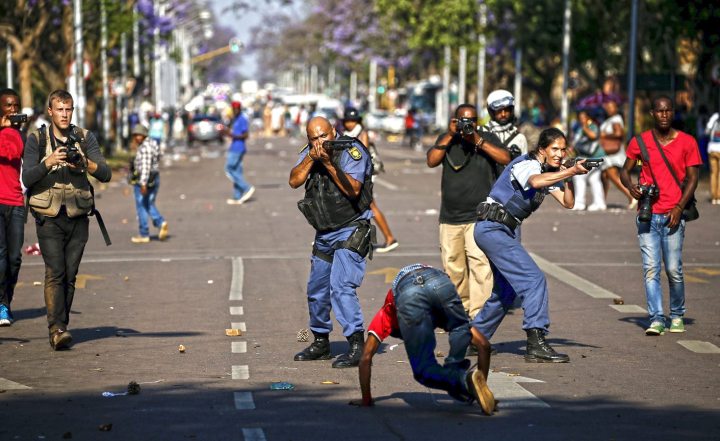South Africa
The police minister’s 2016 top resolutions: Transformation & Professionalism

Police Minister Nkosinathi Nhleko and top-level police this weekend got together to discuss their resolutions for 2016. Transformation and professionalism will be key words as the recommendations from the Marikana Commission of Inquiry continue to be implemented. By GREG NICOLSON.
“We have asked ourselves a question: what is it that should define policing in 2016?” Minister of Police Nkosinathi Nhleko asked on Sunday, flanked by SAPS Acting National Commissioner, Khomotso Phahlane, and Hawks head, Mthandazo Ntlemeza. Provincial police leaders were watching while seated behind the media in the Pretoria press conference. In reply to his question, Nhleko answered: “Transformation and professionalism”.
The Minister and police leaders were briefing the media on their plans for 2016, offering statistics on police work over the festive season, and providing an update since Nhleko told Parliament in September how the recommendations of the Marikana Commission of Inquiry would be used to create a more accountable, transparent and professional police service. The Minister said the gist of issues on transformation and professionalism will emerge from a panel of experts. The Marikana Commission of Inquiry report last year recommended a panel be established to revise Public Order Policing (POP) prescripts, investigate policing methods, and compare them to international best practice, assess training methods, and assess expert submissions to the inquiry.
On Sunday, Nhleko said they have “made some progress” in establishing the panel and after a series of consultations he announced seven members. They include:
- Temba Masuku from the Centre for the Study of Violence and Reconciliation;
- Gun-Free South Africa’s Adele Kirsten;
- Gareth Newham from the Institute of Security Studies;
- independent researcher David Bruce;
- international policing expert Cees de Rover, who was testifying for the police at the commission, but ended up criticising them, and
- Criminologist Elizabeth Grobler.
The experts, many of whom have been critical of the police and its attempts to transform, will work with SAPS specialists. The list is not exhaustive, Nhleko emphasised, as others may also seek to contribute.
The Minister did not comment on when the panel would need to complete its work, but according to a report from Independent News it would have 15 months, including three months for writing. Asked if POP would improve, Nhleko said, “All I can say is that everything possible would be done, and of course the question of international best practice kind of issues have got to be factored, and be at the centre of how well do we equip our unit of Public Order Policing…. All we can do is to improve from this particular position onwards.”
The panel will also include input from representatives from Russia, China, Brazil and Italy, the countries Nhleko said reflect South Africa’s culture of protest. The Minister also listed some of the legislation, and policies he wants to focus on this year, including the White Paper on Safety and Security, the White Paper on Police, and policies on de-militarisation and professionalisation, which he said need to be prioritised. He also said the Critical Infrastructure Bill, Firearms Control Bill, and Independent Police Investigative Directorate Bill will also be focused on in 2016.
According to Acting National Commissioner Phahlane, the SAPS back to basics programme for 2016 will, in practice, mean targeting improvements in “discipline and the manner in which police officers conduct themselves”, “enhanced police visibility”, “targeted, informed deployment of operational resources” and reforming areas of chronic under-performance, such as detective services, and the worst police stations. Over the festive season, visible policing (with 20,000 officers deployed daily) was praised by the public, Phahlane said, vindicating the decision to deploy police trainees.
Nhleko also said they plan to hold an Africa-Russia summit in Durban in March on fighting international human trafficking and drug smuggling. The summit will include countries from across Africa, Russia and other BRICS members and form a document to be tabled at the United Nations.
Phahlane condemned the ongoing attacks that continue to see police officers killed. But when asked about police brutality he claimed there have been improvements already in public policing. “It pains me to hear we are brutal; there was references to 2012, now we have moved on since 2012,” he replied to a journalist. While the SAPS was criticised for shooting rubber bullets and teargas at students during the #FessMustFall protests, and on Saturday there were allegations that a man died at the hands of police in Kempton Park, the acting commissioner said there have been many protests in the last few years with fewer deaths. There were no fatalities during the student protests despite the stones thrown at the police, he said.
Last week, a former Klipgat POP officer was found guilty of murder for killing three protesters during protests in Mothutlung, North West, in 2014. Warrant Officer Hyde Mophosho used SSG buckshot ammunition on protesters and will be sentenced in February. According to News24, the officer, while he was debriefed, said he got the shotgun shells from Marikana, but later he denied this. In Marikana, one of the unresolved issues was how some protesters were shot by police on 16 August 2012 with shotgun pellets, banned in police crowd interventions.
Regarding other recommendations from the Marikana Commission, Nhleko said he could not comment on the inquiry into suspended National Commissioner Riah Phiyega’s fitness to hold office as it was not organised by the police Ministry. In December, the Presidency announced it wanted to meet with lawyers of those who have made civil claims against the state over Marikana by 29 January to discuss resolving the compensation claims. DM
Photo: A protester falls to the ground as police officers fire during a protest over planned increases in tuition fees outside the Union building in Pretoria October 23, 2015. REUTERS/Siphiwe Sibeko.


















 Become an Insider
Become an Insider